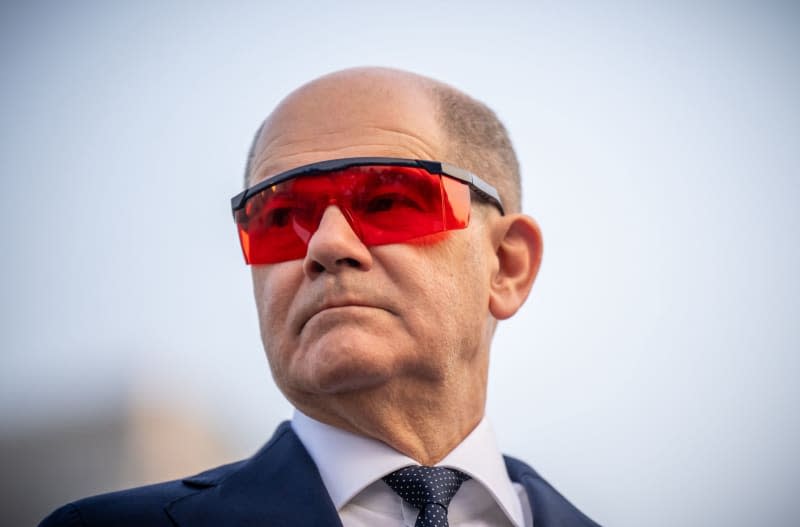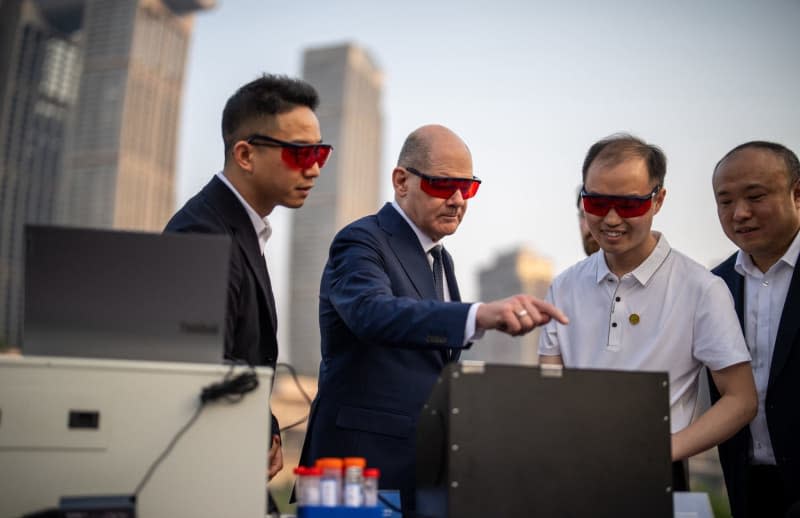Chancellor Olaf Scholz began a three-day visit to China on Sunday that was overshadowed by Iran’s unprecedented airstrike on Israel.
Scholz learned about Tehran’s massive drone and missile attack during his night flight to the Chinese metropolis of Chongqing, which has around 32 million inhabitants.
Immediately after landing, Scholz condemned the attack “in the strongest possible terms,” as government spokesman Steffen Hebestreit explained on his behalf.
Scholz later said that it was “an absolutely unjustified attack, it is a serious escalation of the situation.”
“All we can do is to warn everyone, especially Iran, not to carry on like this,” he said, reaffirming Germany’s solidarity with Israel and the country’s right to defend itself since the Hamas terror attack on October 7 last year to defend.
During the flight, Scholz was constantly informed about the escalation in the Middle East. The delegation was also in close contact with the German security authorities. However, there were no telephone conversations with allies from the plane.
A video conference with G7 leaders was called that evening to coordinate their response to the attack. An IT expert accompanies the Chancellor on his trip to ensure that communications from China are secure from interception.
The retaliatory strike had been expected for days after a suspected Israeli-led airstrike on the Iranian embassy compound in the Syrian capital Damascus. Despite signs that it could happen this weekend, Scholz decided to continue his trip to China.
With a planned visit to a Bosch production plant for hydrogen drives accompanied by a high-profile business delegation, the Chancellor largely stuck to his original program.
A planned lecture with students on the subject of urban planning remained on the agenda, as did a meeting of German and Chinese researchers on the subject of water quality and a meeting with the regional secretary of the Communist Party Yuan Jiajun.
However, sightseeing was canceled, so Scholz did not take part in a planned boat trip on the Yangtze River or a city tour.
Scholz’s visit is expected to continue in the economic and financial center of Shanghai on Monday. He is expected in Beijing on Tuesday for political talks with Chinese President Xi Jinping and Prime Minister Li Qiang.
These two appointments alone – for which the Chinese leadership had several hours to spare – ruled out the trip being canceled.
The talks could also be helpful in view of the new escalation of the Middle East conflict, which China had previously held back.
However, on Sunday Beijing expressed “deep concern.” In a statement, the Foreign Ministry called on all sides to “exercise calm and restraint to prevent further escalation of tensions.”
Scholz is also expected to discuss the conflict in Ukraine when he meets with Xi, considered one of Russian President Vladimir Putin’s closest allies.
Meanwhile, the trip is seen as an important test of Germany’s new “risk reduction” strategy towards China, which Scholz’s coalition government agreed to last year.
The aim is to reduce economic dependence on China after Germany learned from its energy dependence on Russia when Moscow launched its full-scale invasion of Ukraine. However, China remains Germany’s second largest trading partner.
The Chancellor will be accompanied by a dozen top managers. Among them are the CEOs of the car manufacturers Mercedes-Benz and BMW as well as the chemical company BASF.
In Beijing, Scholz is expected to be accompanied by Agriculture Minister Cem Özdemir, Transport Minister Volker Wissing and Environment Minister Steffi Lemke.
It is Scholz’s second trip to China since taking office in December 2021. His inaugural visit in November 2022 was only a day trip due to the ongoing coronavirus pandemic. This time he is taking three days – more than ever before for a single country in one trip.
According to China’s state news agency Xinhua, which is considered the mouthpiece of the Communist Party, Beijing expects the visit to “inject new impetus” into bilateral relations.



